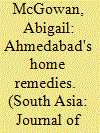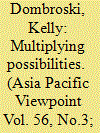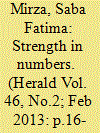|
|
|
Sort Order |
|
|
|
Items / Page
|
|
|
|
|
|
|
| Srl | Item |
| 1 |
ID:
123068


|
|
|
|
|
| Publication |
2013.
|
| Summary/Abstract |
Long known as innovative in modernist architecture, mid century Ahmedabad was also pioneering in another area of built form: housing. Starting in the 1920s when Indians seized control of urban politics, Ahmedabadis launched a number of bold new initiatives to improve housing in the city, involving a striking range of actors-labour activists, middle-class reformers, mill owners, and municipal leaders. Largely ignored under earlier British leadership, housing became a key way for Ahmedabadis to lay claim to a new, more inclusive vision of the city. Although housing continued to play a prominent role in politics after Independence, the 1950s actually marked a retreat from that earlier inclusive vision, ultimately enshrining the class and community segregation that marks Ahmedabad today.
|
|
|
|
|
|
|
|
|
|
|
|
|
|
|
|
| 2 |
ID:
163582


|
|
|
|
|
| Summary/Abstract |
Which types of militarization affect child mortality? Which type appears to lower it; which appears to push it higher? This article focuses on social militarization (i.e., troops as a proportion of workforce-aged population) and praetorian militarization (i.e., the military’s control or strong influence over the government), investigating their impact on child mortality using pooled time series analysis covering 142 countries from 1996 through 2008. We find that social and praetorian militarization have opposite effects even after controlling for potentially confounding influences. Access to basic public health infrastructures and education mediates between each type of militarization and child mortality.
|
|
|
|
|
|
|
|
|
|
|
|
|
|
|
|
| 3 |
ID:
175530


|
|
|
|
|
| Summary/Abstract |
Community radio in India operates within a clear framework of development. This calls into question the fundamental purpose of community radio: communication rights, activism, voice, community participation or development? Drawing on ethnographic research conducted at two rural stations in South India, this research explores the influence of a pervasive development discourse on the grassroots activities and functions of community radio. The starkest example of this was observed through the far-reaching influence of the Government of India’s highly publicised sanitation programme, the Swachh Bharat Mission. This programme represents a pervasive example of the modernisation paradigm in development communication, yet it was found to proliferate throughout community radio, a medium more often associated with participatory communication. This development discourse was found to profoundly impact the way both broadcasters and audience members engage with and experience community radio. The findings highlight a disconnect between the theoretical and ideological frameworks of community radio and the ways in which a development discourse operates through the stations at the grassroots level. As such, this article argues that community radio in India represents a liminal space where multiple development communication paradigms interact and compete with the theoretical underpinnings of the movement.
|
|
|
|
|
|
|
|
|
|
|
|
|
|
|
|
| 4 |
ID:
142636


|
|
|
|
|
| Summary/Abstract |
Postdevelopment thinkers and writers have critiqued development discourse for its role in perpetuating inequality. In water, sanitation and hygiene (WASH) literature and interventions, the discourse used perpetuates inequality through classing anything other than private toilets as ‘without sanitation’. This implies that the people who use forms of hygiene and sanitation relying on collective toilets and alternative strategies are somehow unhygienic. Yet residents of Xining (Qinghai Province, China) rely on hygiene assemblages that do not always include private toilets, but nonetheless still work to guard health for families with young children. In this paper, I develop a postdevelopment approach to hygiene and sanitation starting with the place-based hygiene realities already working to guard health in some way, then working to multiply possibilities for future discursive and material hygiene realities.
|
|
|
|
|
|
|
|
|
|
|
|
|
|
|
|
| 5 |
ID:
171089


|
|
|
|
|
| Summary/Abstract |
Existing histories of public health in Iran often center on elite or urban narratives. This paper shifts the focus to Iran’s villages by examining the twentieth century public health history of rural northern Khuzestan. It argues that Khuzestani villagers desired, rather than resisted, modern medical services. However, vertical decision-making and the prioritization given by public health planners to economic concerns over social well-being led to the uneven distribution of services and failure to fulfill the expectations of Khuzestan’s villagers. This paper uses memoirs, official reports, correspondence, and other records from the Development & Resources Corporation, along with reports from Iran’s Ministry of Education and Ministry of Health, to bring a richer picture of Iranian villagers’ twentieth century history into focus.
|
|
|
|
|
|
|
|
|
|
|
|
|
|
|
|
| 6 |
ID:
187543


|
|
|
|
|
| Summary/Abstract |
This article focuses on sanitation technology, particularly sterilization ( etüv makinesi ), and disinfection machines ( pulverizatör ) used at quarantine stations, hospitals, and also mounted on ships and trains to prevent the spread of contagious diseases in the late Ottoman Empire. As a result of the contemporary developments in sanitation technology, the scientific discussions held at the international sanitary and hygiene conferences, and the health inspectors’ reports, the sterilization and disinfection machines became the main tools of Ottoman sanitary reform efforts to protect public health in the late Ottoman Empire. Despite controversies including a dispute between the French Consulate and the Ottoman officials about who owned the patent rights to the machine and the logistical problems related to their distribution, the sterilization and disinfection machines were extensively used against epidemics in the Empire. This article traces how the Ottomans implemented this sanitation technology, first by importing, later ‘re-inventing’, and finally adopting it throughout the Empire in the late nineteenth century.
|
|
|
|
|
|
|
|
|
|
|
|
|
|
|
|
| 7 |
ID:
119510


|
|
|
| 8 |
ID:
169125


|
|
|
|
|
| Summary/Abstract |
Urban development, and particularly the improvement of basic services delivery, is still approached in mostly technical terms by international development actors and municipalities of the Global South. Sanitation planning, for instance, remains the realm of engineers despite decades of evidence that conventional approaches focusing on infrastructure upgrading have failed to tackle socio-environmental challenges. Against this background, this paper explores sanitation planning in Mandalay, the second largest city of Myanmar. Here, the Asian Development Bank and a French consulting firm have seized the opportunity created by the country’s recent opening to embark with the municipality on a multi-million dollar scheme: the Mandalay Urban Services Improvement Project (MUSIP). Drawing upon insights from critical development studies, the paper argues that the MUSIP can be interpreted as an ‘anti-politics machine’ that ignored local needs and proposed disputable solutions to local sanitation challenges. The paper further explores how this machine jeopardised urban development in Mandalay more generally, and was eventually challenged by the municipality. The paper concludes that the case is not unique and illustrates how urban development is today being reshaped throughout Myanmar, while it also shows the continued relevance of the ‘anti-politics’ framework to understand contemporary urban development assistance projects.
|
|
|
|
|
|
|
|
|
|
|
|
|
|
|
|
|
|
|
|
|